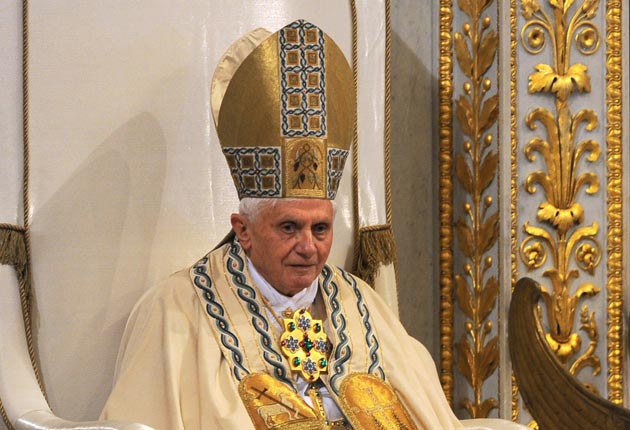Pope's organs are too holy to donate to mortals, says Church

Your support helps us to tell the story
From reproductive rights to climate change to Big Tech, The Independent is on the ground when the story is developing. Whether it's investigating the financials of Elon Musk's pro-Trump PAC or producing our latest documentary, 'The A Word', which shines a light on the American women fighting for reproductive rights, we know how important it is to parse out the facts from the messaging.
At such a critical moment in US history, we need reporters on the ground. Your donation allows us to keep sending journalists to speak to both sides of the story.
The Independent is trusted by Americans across the entire political spectrum. And unlike many other quality news outlets, we choose not to lock Americans out of our reporting and analysis with paywalls. We believe quality journalism should be available to everyone, paid for by those who can afford it.
Your support makes all the difference.Benedict XVI has tried to scotch rumours that he carries an organ donor card after his secretary revealed that his ascension to the position of Holy Father means he is no longer able to bequeath his body parts to lesser mortals.
On the pontiff's instructions, Monsignor Georg Gaenswein, Benedict's personal secretary, fired off a letter to quell the rumours that started in the Pope's native Germany.
"It's true that a simple cardinal can have an organ donor card but, despite public declarations to the contrary, it ceased to apply when he was elected head of the Catholic Church," Mgr Gaenswein said.
In 1999, the then-Cardinal Ratzinger said he was on an organ-donor list. "I am available to offer my organs to whoever might need them. It is an act of love, of affection and generosity," he said at the time.
And as recently as 2008, three years after being elected pontiff, Benedict attended an international congress on donor transplantation where he repeated his support for organ donors. "It's a special way of showing charity," he said, though he added that donations had to be "free, voluntary [and] respectful of the health and dignity of the donor".
Mgr Gaenswein did not specify why the Pope is not able to donate his organs. But Archbishop Zymunt Zimowski, a member of the Vatican health council, said it was because the body of the Pope effectively belonged to the entire Catholic Church. "It's understandable that the body of the Pontiff should rest intact because, in his role as successor to Saint Paul and universal pastor of the Catholic Church, he belongs entirely to the Church in spirit and body," he told La Repubblica.
But pontiffs' bodies have not always been kept intact. Until the end of the 19th century, it was traditional for a pontiff's organs to be preserved after his death and kept in an urn in the Church of Saints Vincenzo and Anastasio near Rome's Trevi Fountain. In 1958, after the death of Pope Pius XII, an Italian doctor devised a new method for conserving the body without extracting the organs. Unfortunately it was not a success; the body turned green and began to putrefy.
In other health matters, the Corriere della Sera newspaper reported that the Vatican is preparing guidance for health workers in relation to HIV/Aids. Last year, Pope Benedict said that condom use by male and female prostitutes could be a good thing because it indicated the user's intention to protect others from a deadly infection.
His comments appeared to back the use of condoms by sex workers to prevent the spread of the Aids virus.
Join our commenting forum
Join thought-provoking conversations, follow other Independent readers and see their replies
Comments